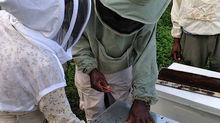Oh, for a bee's experience: protecting garden pollinators
- Rhonda Nowak
- Mar 25, 2016
- 3 min read

"The pedigree of honey Does not concern the bee; A clover, any time, to him Is aristocracy." — Emily Dickinson, 1890
(Original Article for the Mail Tribune)
Nineteenth-century American poet Emily Dickinson was an avid gardener and bee watcher, inspiring her to mention bees in several of her verses about nature. However, these small yet immensely important pollinators are a bit more discerning than the poet believed. In fact, flower preferences are primarily based on the length of the bee’s tongue; therefore, some short-tongued honeybees find the deep flowers of red clover difficult to reach into, but they adore crimson and white clover. Go figure, Emily!
Whereas longer-tongued bees, such as carpenter and leafcutter bees, frequently specialize in a few plant species, shorter-tongued bees, like the bumblebee and sweat bee, are more apt to be generalists, visiting many different kinds of flowers. There is evidence that bees are adapting to climate change and loss of habitat by developing shorter tongues, making a larger range of flowers more accessible to them.
Indeed, the vigor of bee populations is an indicator of environmental health and balance. Bees serve this essential role in our home gardens, while also greatly enhancing our gardening experiences with their effervescent sound and motion. Gardeners can take several steps to welcome bees and extend their stay among our vegetables and flowers. Garden by garden, the actions we take can make a difference in extending our winged friends’ habitation on our planet. The following include tips from the Pollinator Partnership (www.pollinator.org).
Plant food crops that attract bees: apples, blueberries, cherries, eggplant, legumes, squash, tomatoes, thyme and watermelons. Herbs that especially appeal to bees are mint, oregano, garlic, chives, parsley and lavender.
Raise ornamental flowers bees can’t resist. They love bright white, yellow and blue flowers with mild, pleasant fragrances, and shallow or tubular-shaped flower heads that have a lip or space for landing. Try daisies, asters, sunflowers, coreopsis, blanket flowers, snapdragons, penstemons, cosmos, sweet peas, foxgloves and zinnias. Keep in mind that bees prefer single-petal flowers because double-petal hybrids can be confusing to enter.
Grouping flowers in drifts will provide protection and facilitate pollination, but be sure to leave some bare ground space (and maybe even a few weeds or dead leaves) for ground-dwelling bees to nest. Bee condos can also be built by drilling holes of different sizes into a 4-by-6-inch post, and then placing it in the ground or attaching it to a wall. Having a clean water source, such as a well-tended birdbath, nearby will offer further hospitality for our bee-you-tiful garden guests.
Most importantly for the health of our bees is avoiding harmful chemicals. Practicing Integrated Pest Management not only makes us better stewards of the land and of our pollinators, it also helps to make us better gardeners. IPM is based on the fact that insect pests are a sign of an unbalanced garden with weakened plants. IPM is central to the OSU Extension Service’s Master Gardener program and plant clinic recommendations (http://extension.oregonstate.edu/).
On April 16, a conference called Pesticides, People, Pollinators and the Planet: Safer, Healthier Practices and Policies will take place from 8 a.m. to 5 p.m. at Southern Oregon University. Keynote speaker is Kim Leval, executive director at the Northwest Center for Alternatives to Pesticides. Six panel discussions, several workshops and an organic lunch are included. Cost is $10; students with ID get in free. Bee Happy Hour, a fundraiser for the conference, will take place from 5-7 p.m. April 15 at SOU’s Hannon Library. Cost is $20 at the door. For information, see www.pollinatorprojectroguevalley.org/.
Emily Dickinson also wrote of the bee, “His labor is a chant, his idleness a tune; Oh, for a bee’s experience of clovers and of noon!” Let’s work together to ensure bee survival for generations to come.
Rhonda Nowak is a member of the Jackson County Master Gardener Association and teaches writing at Rogue Community College. Email her at rnowak39@gmail.com.
ORIGINAL ARTICLE: By Rhonda Nowakfor the Mail Tribune Posted Mar. 20, 2016 at 12:01 AM




































Comments